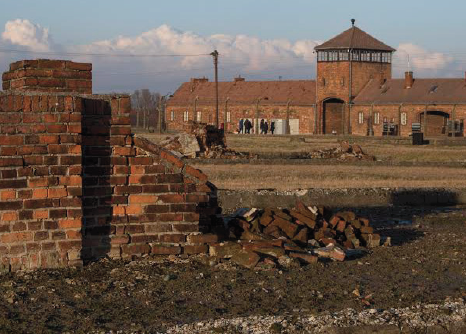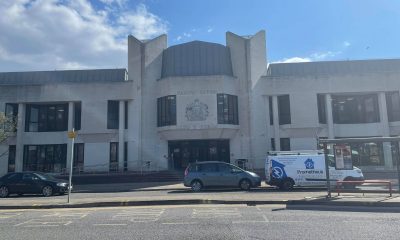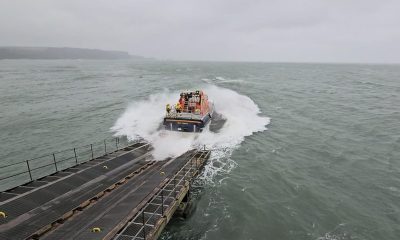News
Auschwitz ‘must be experienced’

 AROUND 200 students from schools and colleges across Wales have visited the Nazi concentration and death camp Auschwitz- Birkenau in Poland as part of the Holocaust Educational Trust’s Lessons from Auschwitz Project.
AROUND 200 students from schools and colleges across Wales have visited the Nazi concentration and death camp Auschwitz- Birkenau in Poland as part of the Holocaust Educational Trust’s Lessons from Auschwitz Project.
Now in its seventeenth year, the project is based on the premise that ‘hearing is not like seeing’.
On the visit, students first visited Oswiecim, the town where the Nazi concentration and death camp was located and where, before the war, 58% of the population was Jewish.
Before visiting the concentration camp, students were taken to a Jewish Cemetery in the town of Oswiecim.
The Town’s last known Jewish person passed away in 2000 and a central grave was built for this person.
However, pupils learned that the gravestones did not necessarily correspond with the deceased because these were replacements after Nazis dug up the original gravestones to use them to build roads.
Students then visited Auschwitz I to see the former camp’s barracks and crematoria and witnessed the piles of belongings that were seized by the Nazis.
Among the belongings were numerous pots and pans, shoes, brushes and suitcases.
Pictures of the prisoners held at the camp were also displayed in numerous buildings.
They were given a guided tour of the facilities and also shown were the Jewish people were taken to be gassed.
The gas chamber was created at Auschwitz I in late 1941 but in 1942 killing operations largely moved to Birkenau where two gas chambers were created in specially adapted cottages near the camp.
Finally they spent time at the main killing centre of Birkenau where the day concluded with candle lighting and a period of reflection to remember the six – million Jews killed in the Holocaust and the other victims of Nazi persecution.
The visit to Auschwitz-Birkenau was preceded by a seminar in the UK where participants were introduced to Jewish life in Europe before the Second World War and heard the testimony of a Holocaust survivor.
The overall number of people murdered at Auschwitz-Birkenau is estimated to be approximately 1.1 million people. They included: around 1 million Jews; around 64,000 Poles; around 21,000 Sinti and Roma; around 15,000 Soviet POWs and around 12,000 victims from other groups.
Other prisoners died from disease, starvation, exhaustion or brutal treatment by guards.
The students will now become ambassadors for the Holocaust Educational Trust and will undertake their ‘next steps’ to share their experience with their schools and their wider community.
Karen Pollock MBE, Chief Executive of the Holocaust Educational Trust said: “The Lessons from Auschwitz Project is a vital part of our work, allowing young people to learn about the Holocaust in a way they cannot in the classroom.
“The visit enables young people to see for themselves where racism, prejudice and antisemitism can ultimately lead and its importance is demonstrated by the inspiring work students go on to do in their local communities.”
Pupils from Greenhill School in Tenby and Ysgol y Preseli were among the representatives from Pembrokeshire on the trip.
Students described the experience as ‘surreal’ and added that they were shocked by the number of personal belongings that were on display at the museum.
One of the students commented: “The day was extremely tiring, both physically and emotionally.
“It was highly moving to see such genuine, re-humanisation of the victims
“One of the most educational days of my life, almost too much to absorb in such a short period of time.
“The experience at Birkenau was indescribable, and different to anything I have ever experienced. The atmosphere of the camp was heavy with tragedy. The size and scale of the place cannot be justified by words, it must be experienced.
“The ceremony, hosted by the Rabbi Marcus was invaluable to the experience as it gave a chance for much needed reflection and also the chance to get a deeper insight of the thoughts and feelings of the contemporary Jewish population.”
Another student commented: “Visiting Auschwitz 1 and Auschwitz-Birkenau was such a surreal experience. Actually visiting the camps made everything more real than seeing the images on line. It was shocking to see the personal belongings in Auschwitz 1 where everything was kept behind glass.
“There were two sides of a hallway full of shoes – this made me think of how many were actually brought to these camps and had their innocent lives taken away from them for no apparent reason. Five minutes away was Birkenau, the death camp of wooden barracks – although many had been torn down by now.
“The living conditions in this camp were disgusting and brutal. To think people were made to live like this is totally beyond me and I dare even to think why something as horrible as this ever happened to begin with. 6 million murdered in the Holocaust – people with families and friends and lives, they had it all taken away from them by other human beings. It makes me wonder if humanity could go any lower.”
Crime
Nine deny Class A drugs conspiracy as case set for Crown Court trial

Eight remanded in custody as four-week trial fixed for May 18
NINE people have denied conspiring to supply Class A drugs into Pembrokeshire following a major police investigation.
The charges relate to the alleged supply of Class A drugs between February and November 2025. The arrests were made as part of a proactive operation led by Dyfed-Powys Police’s Serious and Organised Crime Team, with warrants executed across Carmarthenshire, Pembrokeshire and areas outside the force area.
All nine defendants appeared before Swansea Crown Court, where they entered not guilty pleas.
Those charged are:
- Tommy Lee Jones, 32, of Castle Quarry, Monkton
- Ryan Hare, 27, of Heol Cae Pownd, Cefneithin
- Kalum Haines, 22, of Woodland Park, Neyland
- Leon Haines, 25, of Ashdale Lane, Pembroke
- Zack Fecci, 20, of Hawkstone Road, Pembroke Dock
- Ahmed Al-Farraji, 25, of Topaz Street, Cardiff
- Usman Afsar, 40, of Woodborough Street, Bristol
- Adam Noraddin, 25, of Plas Nanthelyg, Cardiff
- Mili Davies-Blewett, 25, of land adjacent to Pen Rhos, Maesybont, Carmarthenshire
Eight of the defendants were remanded in custody. Davies-Blewett was re-granted bail.
They will next appear at Swansea Crown Court on May 18.
Community
No asylum seekers housed in west Wales hotels, latest Home Office figures show

WEST Wales currently has no asylum seekers being housed in hotels, according to the latest figures published by the Home Office.
Data released up to December 31, 2025 shows that 30,657 people were being accommodated temporarily in hotels across the UK while awaiting decisions on their asylum claims. The figure represents the lowest level recorded for 18 months.
However, the statistics confirm that none of those individuals are being housed in hotels in any of the five counties that make up west Wales. Hotels across Carmarthenshire, Ceredigion and Pembrokeshire are all recorded as accommodating zero asylum seekers.
The use of hotels for asylum accommodation became a major national political issue in recent years, with protests taking place outside some sites across the UK.
Labour has pledged to end the use of asylum hotels by the end of the current Parliament, which would be 2029, if not sooner.
Plans previously existed to house asylum seekers in west Wales. The Home Office withdrew proposals to accommodate up to 241 people at the Stradey Park Hotel in Carmarthenshire in October 2023 after protests outside the site led to arrests. Dyfed-Powys Police issued an appeal for “calm and co-operation” following what they described as a concerning escalation in behaviour.
The hotel, which had been intended to house families awaiting asylum decisions, subsequently closed, resulting in the loss of 95 jobs, including 50 full-time and 45 part-time roles, and the cancellation of events.
West Wales has also previously hosted asylum accommodation at Penally military training camp near Tenby. The site was used between 2020 and spring 2021 to house between 240 and 250 men, mainly from countries including Iraq, Iran and Syria.
Both the Welsh Government and Pembrokeshire County Council argued the camp was unsuitable, with inspectors describing conditions as run down. The facility was later closed, residents were relocated elsewhere, and the site was returned to the Ministry of Defence.
Nationally, the number of asylum seekers in hotels peaked at 56,018 at the end of September 2023 under the Conservative government. It later fell to 29,561 by the end of June 2024, just before the general election.
The latest figures show numbers at the end of December were 15% lower than the previous quarter, when 36,273 people were recorded as staying in hotel accommodation.
Cover image: Asylum Seekers at Penally MOD Camp in 2020
Farming
Farmers still in the dark as SFS launches today

SCHEME DETAILS MISSING, SAYS PEMBROKESHIRE MS
FARMERS across Wales are facing continued uncertainty after the Welsh Government confirmed that full details of two key elements of the Sustainable Farming Scheme (SFS) will not be available when the application window opens on Monday (Mar 2).
Officials have acknowledged that further information on the Optional and Collaborative actions — two of the scheme’s core layers — will be published “in due course”, with applications for many of these measures not expected to open until later this year.
While some actions, including organic maintenance and woodland creation, will proceed independently of SFS participation, significant parts of the scheme remain incomplete as farmers are being asked to begin the application process.
The situation has prompted concern within the sector, with farm businesses warning that uncertainty over the scheme’s full scope makes forward planning difficult at a time when margins are already under pressure.
Commenting on the launch, Welsh Conservative Shadow Cabinet Secretary for Rural Affairs, Samuel Kurtz MS said: “It is unacceptable that, as the Sustainable Farming Scheme application window opens, two of its core components — Optional and Collaborative — are still not fully designed. After years of consultation, farmers are being asked to commit to a scheme where significant elements remain undefined or delayed until later in the year.
“Farm businesses cannot plan on the basis of ‘further detail in due course’. Decisions about land use, investment and cashflow require clarity from day one. This last-minute uncertainty reflects a clear lack of foresight from the Welsh Labour Government.
“Farmers were promised stability and certainty. Instead, they are being given ambiguity and a rolling timetable. That is not good enough for an industry that needs confidence, not confusion.”
The Sustainable Farming Scheme is intended to replace the EU-era Basic Payment Scheme and form the backbone of agricultural support in Wales, linking public funding to environmental and land management outcomes.
The Welsh Government has been approached for comment.
-

 News6 days ago
News6 days agoLabour and Plaid criticised over £1.2m anti-racism ‘metaverse’ project
-

 Charity7 days ago
Charity7 days agoCharity launches bid to save Foley House with new community cooperative
-

 Crime7 days ago
Crime7 days agoEleven-year jail term for rape after judge finds victim ‘particularly vulnerable’
-

 Health6 days ago
Health6 days agoHealth services row escalates as MSs demand action over Withybush and Bronglais
-

 Crime7 days ago
Crime7 days agoHaverfordwest man guilty of raping his own sister
-

 Crime7 days ago
Crime7 days agoMerlins Bridge man denies six child sex assault charges
-

 Crime7 days ago
Crime7 days agoMan who threatened to kill Herald editor given suspended prison sentence
-

 Politics6 days ago
Politics6 days agoFarage vows to strip Cardiff’s ‘City of Sanctuary’ status ahead of manifesto launch























Colin canton
April 27, 2020 at 11:28 am
Our children should have an understanding that all innocent victims of war are equal, this type of thing is a clear attempt to create an hierarchy in victimhood with a political agenda and should not be allowed